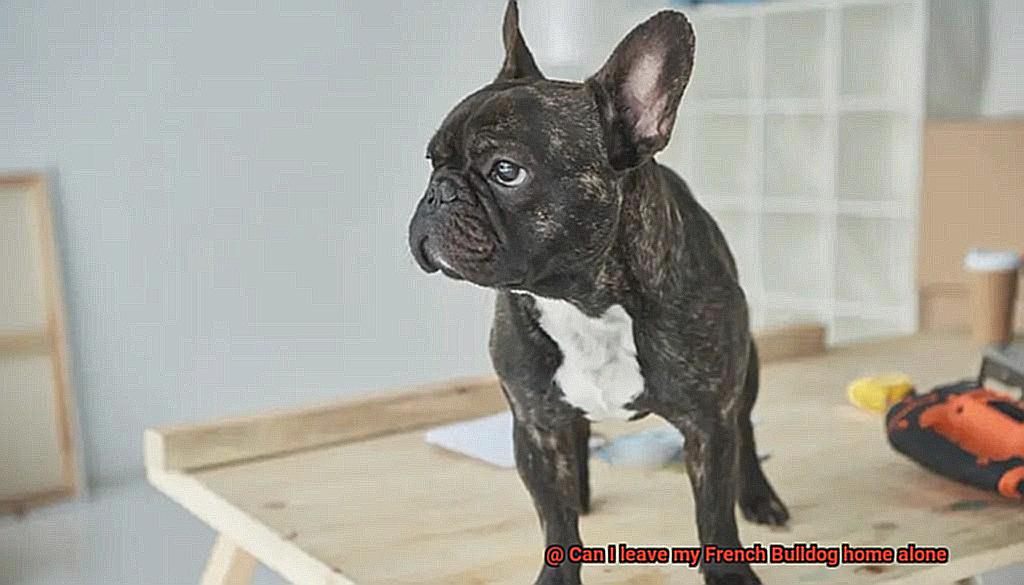Can I leave my French Bulldog home alone?
We totally get it – you love your Frenchie to bits and wish you could be with them all the time. But life has a way of throwing curveballs, making it necessary for us to leave our furry companions home alone.
In this blog post, we’re diving headfirst into the age-old question that haunts every Frenchie parent’s mind – Can I leave my French Bulldog home alone? We’ll explore their quirky personalities, behavioral tendencies, and give you some handy tips on how to ensure their happiness and well-being when they’re flying solo.
Whether you’re hustling at work, hitting the books as a student, or just need to run some errands, understanding the ins and outs of leaving your French Bulldog alone is crucial. That’s why we’ve put together this captivating guide – to arm you with all the knowledge you need to keep your four-legged friend safe and content.
Join us as we debunk myths, share expert advice, and dish out practical tips that will make leaving your French Bulldog home alone a breeze. By the end of this journey, you’ll feel like a pro at balancing responsibilities while keeping that special bond with your Frenchie intact.
So, strap in, grab a treat (for both you and your pup), and let’s discover how our French Bulldogs can thrive even when we’re not around.
What is a French Bulldog?
Contents
- 1 What is a French Bulldog?
- 2 Separation Anxiety in French Bulldogs
- 3 How Long Can I Leave My French Bulldog Home Alone?
- 4 Training Your French Bulldog to be Comfortable with Being Left Alone
- 5 Providing Mental Stimulation and Physical Exercise Before Leaving Your Dog Home Alone
- 6 Using Toys, Puzzle Feeders, and Treats to Keep Your Dog Occupied While You’re Away
- 7 Hiring a Pet Sitter or Dog Walker for Extended Periods of Time
- 8 Ensuring Your Dog Has Access to Fresh Water, a Comfortable Resting Area, and a Safe Space While You’re Away
- 9 Consider Getting a Companion for Your French Bulldog
- 10 Conclusion
French Bulldogs, also known as “Frenchies,” are beloved small-sized dogs that have captured the hearts of many with their adorable appearance and friendly nature.
Here, we will explore the origins, physical characteristics, temperament, and care requirements of French Bulldogs to provide a thorough understanding of what makes them such a special breed.
Origins and Physical Characteristics:
Originating in France during the 1800s, French Bulldogs were initially bred as companion dogs for lace workers. They are descendants of English Bulldogs brought to France by English lace workers during the Industrial Revolution.

French Bulldogs have a distinct square-shaped head, large bat-like ears, and a compact body with a short coat. Their expressive eyes, wrinkled forehead, and pushed-in nose give them a unique and endearing appearance.
Temperament and Personality:
French Bulldogs are known for their affectionate and sociable nature. They thrive on human companionship and easily form strong bonds with their owners. Playful, loving, and adaptable, Frenchies make excellent family pets.
While they are generally friendly towards everyone they meet, French Bulldogs can be protective of their families and are known to be good watchdogs. They may display some stubbornness at times but are generally eager to please their owners.
Physical Attributes and Care Requirements:
With a compact and muscular build, French Bulldogs have a medium-sized frame. They typically weigh between 16-28 pounds (7-13 kg) and stand about 11-12 inches (28-30 cm) tall at the shoulder. Their short, smooth, and shiny coat requires minimal grooming. French Bulldogs come in various colors such as brindle, fawn, white, cream, and combinations of these colors. Regular exercise is important to keep them healthy, but they do not require excessive physical activity due to their moderate energy level.
Leaving a French Bulldog Home Alone:
French Bulldogs, with their strong bonds with their owners, may experience separation anxiety when left alone. It is crucial to gradually train them to be comfortable with being alone by starting with short periods of separation and increasing the duration over time.
The recommended maximum time to leave a French Bulldog alone is around 4-6 hours, although this can vary depending on the individual dog’s needs and temperament.
Providing mental stimulation, access to fresh water, a comfortable resting area, and a safe space is essential when leaving them home alone.
Separation Anxiety in French Bulldogs
French Bulldogs are beloved for their affectionate nature and companionship. However, their social tendencies can also make them susceptible to separation anxiety. If you are concerned about your furry friend experiencing this condition, fret not.
Here, we will delve into the effects of separation anxiety on French Bulldogs and provide you with valuable tips to help your pup feel more at ease when alone.
Recognizing the Signs:
Separation anxiety in French Bulldogs can manifest through various behaviors. Excessive vocalization, destructive tendencies, drooling, pacing, panting, and indoor accidents are all common signs of distress. It is vital to understand that these behaviors stem from anxiety and should be approached with empathy and understanding.
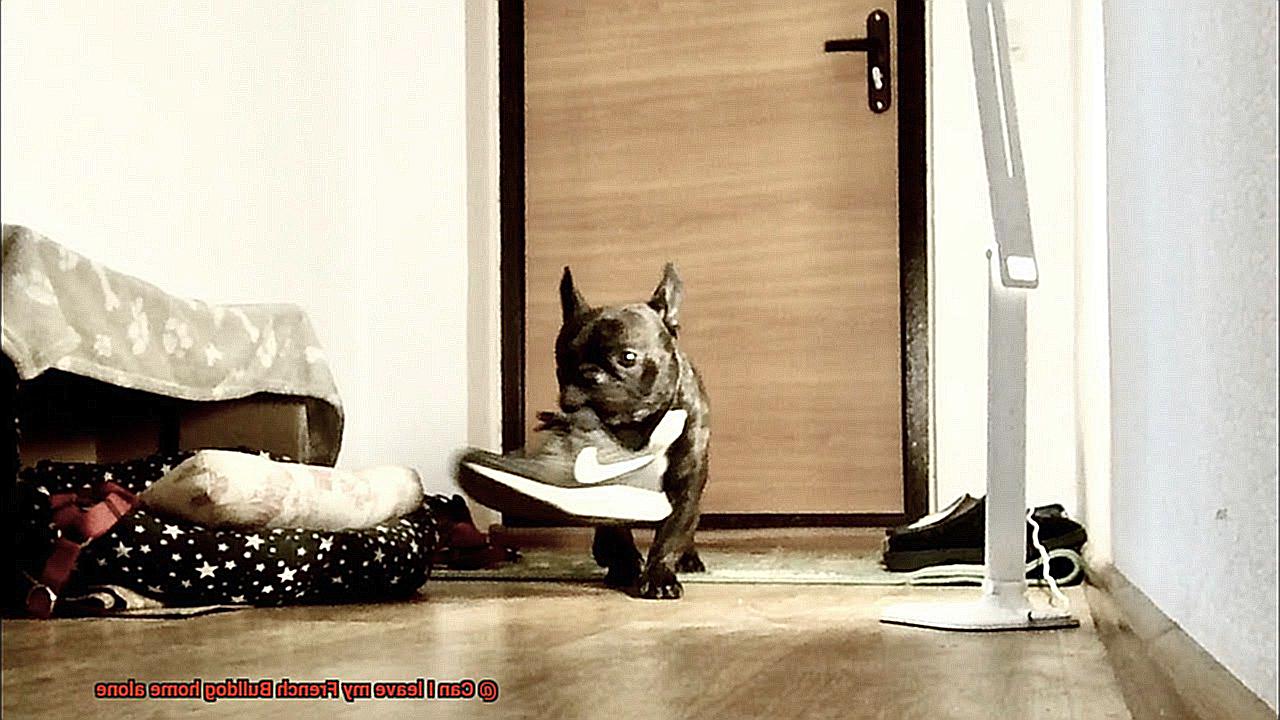
Seek Professional Guidance:
Consulting a veterinarian or professional dog behaviorist is crucial when dealing with separation anxiety. They can evaluate the severity of your Frenchie’s anxiety and guide you on the most effective approach.
Techniques such as desensitization and counterconditioning may be recommended to gradually acclimate your dog to being alone.
Desensitization and Counterconditioning:
Desensitization involves exposing your French Bulldog to brief periods of solitude and gradually increasing the duration over time. This gradual exposure helps them build confidence and reduce anxiety. Counterconditioning focuses on associating being alone with positive experiences, such as offering special treats or toys reserved exclusively for alone time.
Considering Medication:
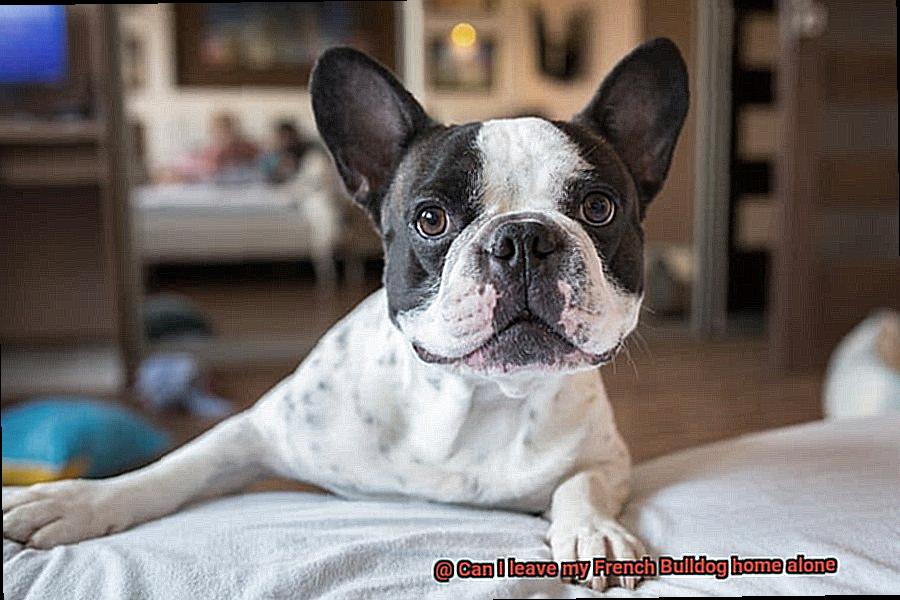
In severe cases, medication prescribed by a veterinarian may be necessary to alleviate the symptoms of separation anxiety. However, this should always be approached under professional guidance.
Consistency and Positive Reinforcement:

Overcoming separation anxiety requires patience and consistency. Consistent training and positive reinforcement are key. Before leaving your Frenchie alone, engage in activities that provide mental and physical stimulation such as walks or interactive play to tire them out.
How Long Can I Leave My French Bulldog Home Alone?
As a general guideline, adult French Bulldogs can be left alone for 4 to 6 hours at a time. However, remember that this is just an estimate, and individual dogs may have different needs. Age, temperament, and overall health play a role in determining their tolerance for being alone.
Puppies have a smaller bladder capacity and require more frequent bathroom breaks. If you have a young Frenchie at home, plan your schedule accordingly to avoid accidents and discomfort.
Exercise is vital for French Bulldogs’ well-being. Before leaving them alone, ensure they have had ample playtime and physical activity to tire them out. A tired dog is less likely to engage in destructive behaviors borne out of boredom.
To combat boredom and loneliness, provide your French Bulldog with mental stimulation. Leave them in a secure area with toys or interactive puzzles to keep them entertained while you’re away.
If you need to leave your Frenchie alone for an extended period, consider hiring a pet sitter or dog walker. They can provide companionship and meet your dog’s needs. Doggy daycare or playgroups are also excellent options for keeping your Frenchie engaged and socialized.
Separation anxiety is common among French Bulldogs. Excessive barking, destructive chewing, or soiling the house can be signs of this condition. If these symptoms persist, consult with a veterinarian or animal behaviorist for guidance.
To prevent or alleviate separation anxiety, gradually acclimate your French Bulldog to being alone. Start with short periods of time and gradually increase the duration over time to build their confidence and reduce anxiety.
Ultimately, assess your individual Frenchie’s needs and consider their well-being when deciding how long to leave them alone. If you have concerns or need further guidance, consult with a veterinarian or dog behavior specialist for personalized advice.
Training Your French Bulldog to be Comfortable with Being Left Alone
Leaving your French Bulldog alone can be a cause of concern and anxiety. However, with the right training and techniques, you can help your furry friend feel comfortable and secure when left alone. In this guide, we will explore key steps to help train your French Bulldog to be at ease with being left alone.
From creating a safe space to providing mental stimulation and establishing a consistent routine, these strategies will contribute to a happier and more confident pup.
Building Trust and Confidence
- Start with short periods of separation and gradually increase the duration.
- Create a designated safe space, such as a crate or a room, that provides comfort and security for your dog.
- Ensure the environment is free from hazards and well-ventilated.
Positive Reinforcement and Association
- Reward calm behavior with treats, praise, and affection when your dog is left alone.
- Associate positive experiences with being alone by providing enjoyable activities or treats.
- Use interactive toys or food puzzles to keep your French Bulldog mentally engaged during solo time.
Expanding Boundaries Gradually
- Once your French Bulldog is comfortable in one area, practice leaving them in different parts of the house.
- Help them understand that being alone is not limited to a specific location.
Establishing a Departure Routine
- Develop consistent departure cues that indicate you’re leaving without actually departing.
- This helps your French Bulldog become desensitized to cues associated with your absence.
Calm Comings and Goings
- Avoid making a big fuss before leaving or returning home to prevent anxiety or excitement.
- Stay calm and maintain a low-key approach during these moments.
Mental Stimulation and Enrichment
- Provide interactive toys, puzzles, or treat-dispensing devices to keep your French Bulldog mentally stimulated while alone.
- This helps alleviate boredom and redirects their focus onto enjoyable activities.
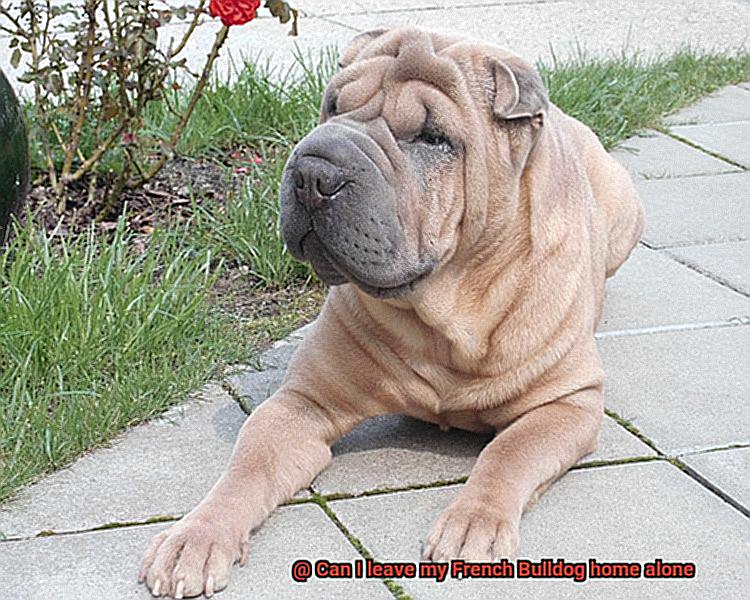
Seeking Professional Assistance
- If your French Bulldog continues to experience distress when left alone, consult a professional dog trainer or behaviorist.
- They can provide personalized advice and guidance tailored to your dog’s specific needs.
Providing Mental Stimulation and Physical Exercise Before Leaving Your Dog Home Alone
Leaving your dog home alone can be a daunting task, but by providing them with mental stimulation and physical exercise beforehand, you can ensure they remain happy and content. This blog post will explore various activities and tips to keep your furry friend entertained and engaged while you’re away.
Engaging their Mind:
Dogs thrive on mental stimulation, so incorporating activities that challenge their minds is crucial. Puzzle toys and interactive games are excellent options as they require problem-solving skills. Obedience training sessions not only stimulate their brains but also strengthen the bond between you and your dog.
Physical Exercise:
Regardless of breed, dogs need regular physical exercise for their well-being. Before leaving your dog alone, make sure they have had enough exercise to tire them out. This can be achieved through walks, playtime, or even agility training. Consider your dog’s age and health when determining the amount and intensity of exercise they need.
Scent Games and Treats:
Mental stimulation can be provided through scent games or hiding treats around the house. Dogs have a natural instinct to search and find things, so tapping into this instinct keeps them mentally engaged. Leaving interactive toys or food-dispensing puzzles can also provide mental stimulation and entertainment throughout the day.
Auditory Stimulation:
Some dogs feel lonely when left alone, so providing background noise can help keep them calm. Leaving the TV or radio on can provide familiar sounds that offer comfort and prevent feelings of isolation.
Using Toys, Puzzle Feeders, and Treats to Keep Your Dog Occupied While You’re Away
Leaving your dog alone at home can sometimes be a cause for concern. Dogs are intelligent and energetic animals that require mental stimulation to prevent boredom and destructive behavior.
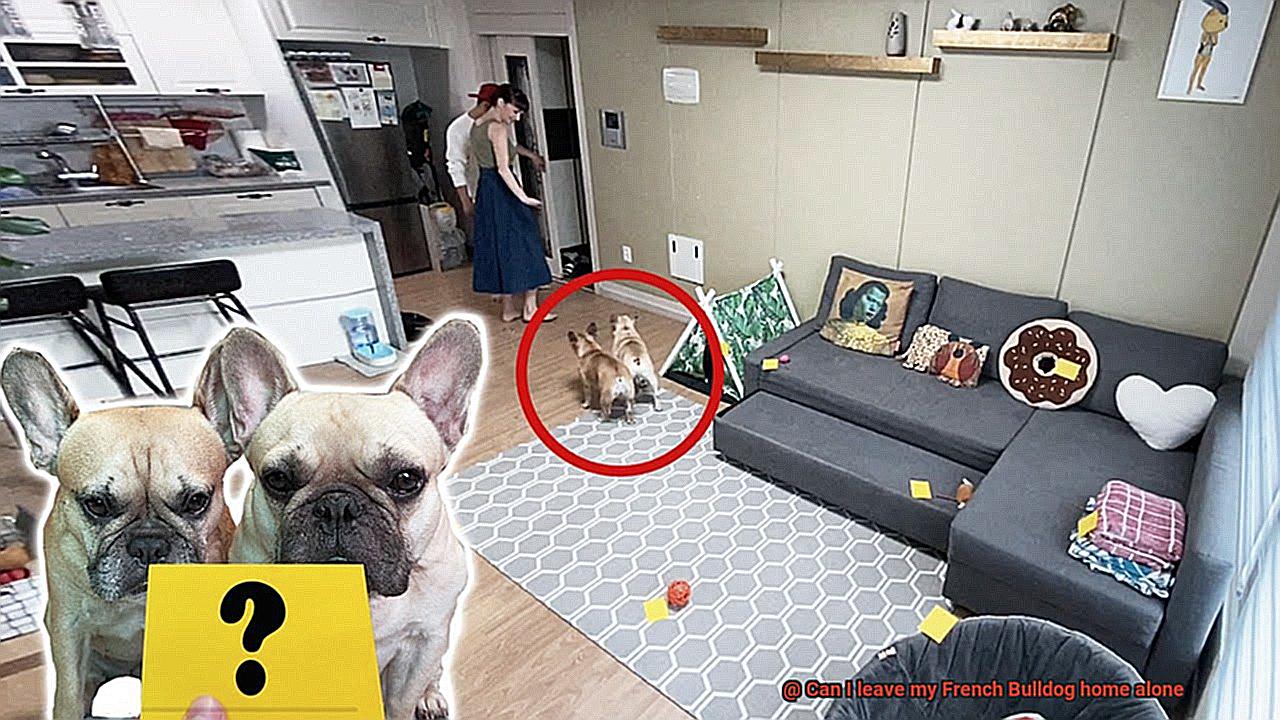
Fortunately, there are effective ways to keep your furry friend occupied while you’re away. By utilizing a combination of toys, puzzle feeders, and treats, you can provide the mental engagement and entertainment your dog needs.
In this article, we will explore the advantages and best practices of using these tools to keep your dog engaged and happy.

Toys:
Toys are a fantastic way to keep your dog mentally stimulated and prevent boredom. Look for interactive toys that challenge your dog’s problem-solving skills, such as puzzle toys or treat-dispensing toys.
Puzzle toys require your dog to figure out how to access the treats, keeping their minds engaged and preventing them from getting bored.
Interactive toys provide mental stimulation through play and engagement with their human counterparts. Choose toys that are durable and safe for your dog’s size and chewing habits to avoid any choking hazards.
Puzzle Feeders:
Puzzle feeders are an excellent way to keep your dog mentally stimulated while satisfying their hunger. These feeders make your dog work for their food, engaging their problem-solving skills and preventing overeating.
There are various types of puzzle feeders available, such as ones that require sliding pieces or ones that require pushing or rolling the toy to dispense the food.
Experiment with different types of puzzle feeders to find one that challenges your dog without frustrating them.
Treats:
Treats can be a valuable tool in keeping your dog occupied while you’re away. Long-lasting treats, such as frozen Kong toys filled with peanut butter or frozen broth, provide hours of entertainment for your dog.
Stuffing treats inside puzzle toys or treat-dispensing toys adds an extra layer of challenge and reward as they work to retrieve the treats.
Remember to choose treats that are appropriate for your dog’s size and dietary needs, and monitor their intake to prevent overfeeding.
Rotation System:
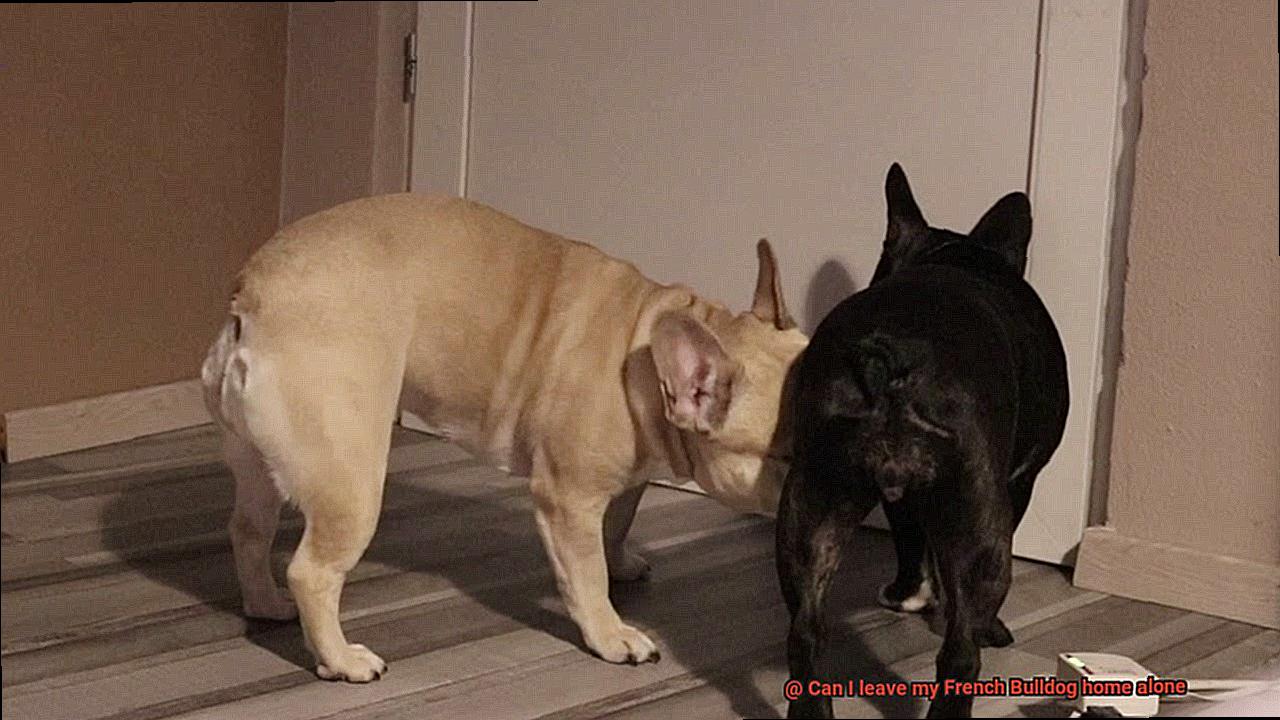
Implementing a rotation system can help keep your dog engaged with their toys and treats. Periodically swap out their toys and treats so that they always have something new and exciting to interact with. This helps prevent boredom and ensures they stay mentally stimulated while you’re away. Regularly inspect toys for signs of wear and tear and replace them as needed to maintain safety.
Hiring a Pet Sitter or Dog Walker for Extended Periods of Time
Leaving your French Bulldog home alone for extended periods of time can be a challenging decision. French Bulldogs are known for their affectionate and social nature, and leaving them alone for long hours can lead to separation anxiety and behavioral issues. That’s where hiring a pet sitter or dog walker comes in. Let’s dive into the importance of this decision and explore the benefits and potential risks associated with it.
The benefits of hiring a pet sitter or dog walker for your French Bulldog are numerous. Firstly, they provide companionship and alleviate any stress or boredom your furry friend may experience while you’re away. Pet sitters can come to your home and spend quality time with your French Bulldog, providing them with attention, playtime, and even feeding if necessary. This ensures that your pup receives the social interaction they crave, reducing the chances of separation anxiety.
Similarly, dog walkers can take your French Bulldog for regular walks, providing both physical exercise and mental stimulation. French Bulldogs are active dogs, and regular exercise is crucial for their overall well-being. Walking not only helps them burn off energy but also exposes them to new environments and allows them to interact with other dogs. This can help prevent boredom-related behaviors such as excessive barking or chewing.
When hiring a pet sitter or dog walker, it’s important to do thorough research to find someone experienced, reliable, and trustworthy. Ask for recommendations from friends, family, or your veterinarian, and consider interviewing potential candidates to ensure they are a good fit for your French Bulldog’s needs. It’s also essential to provide detailed instructions on your pup’s routine, feeding schedule, medications (if any), and any specific behaviors or commands they should be aware of.
While hiring a pet sitter or dog walker can bring numerous benefits, there are some potential risks to consider. It’s crucial to choose someone who is knowledgeable about the specific needs of French Bulldogs. Their unique respiratory system and sensitivity to heat make it important for the pet sitter or dog walker to be aware of potential health risks and take necessary precautions.
Additionally, having a backup plan in case the pet sitter or dog walker is unable to fulfill their duties is essential. Life happens, and emergencies can arise. It’s always a good idea to have a trusted friend or family member available as a backup option, ensuring that your French Bulldog’s needs are met even in unforeseen circumstances.
Regular communication with the pet sitter or dog walker is key. It allows you to stay updated on your French Bulldog’s well-being and address any concerns or issues that may arise. This open line of communication also helps build trust and ensures that your pup is receiving the care and attention they deserve.
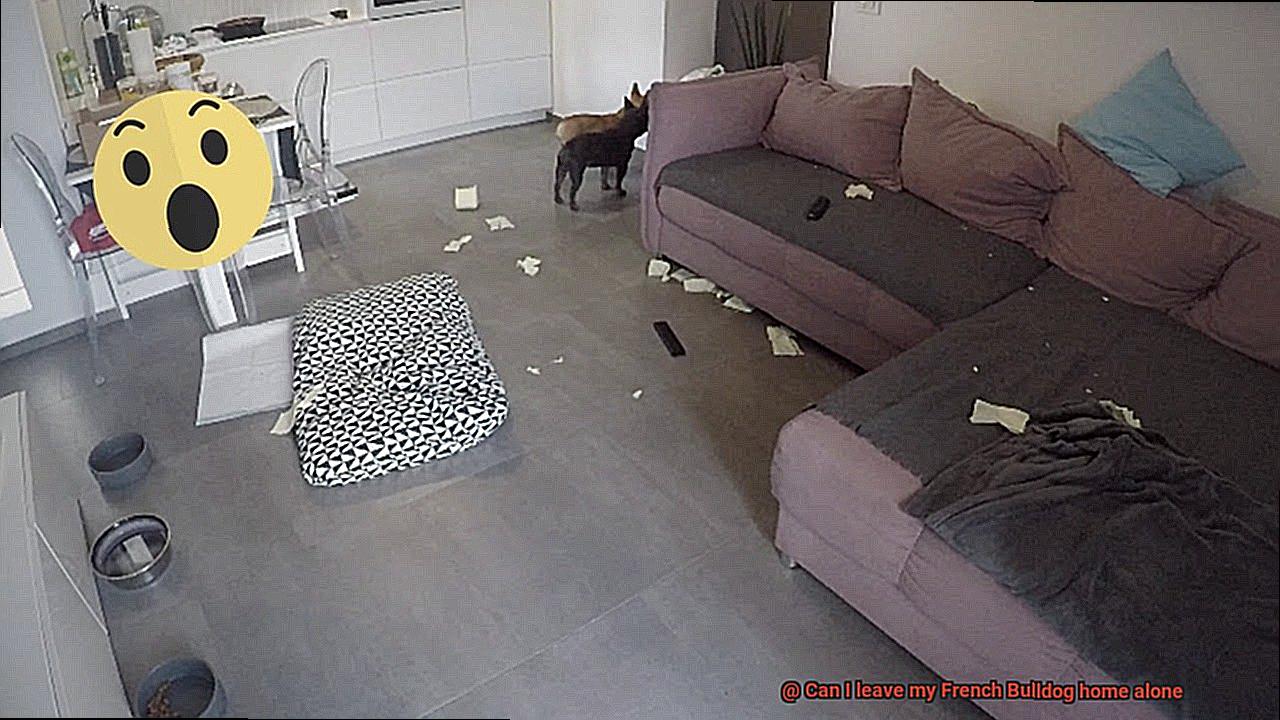
Ensuring Your Dog Has Access to Fresh Water, a Comfortable Resting Area, and a Safe Space While You’re Away
Leaving your cherished French Bulldog alone can be a challenging experience. However, by implementing thoughtful planning and preparations, you can guarantee their comfort, safety, and happiness even in your absence. This blog post will explore practical measures to ensure that your furry friend has continuous access to fresh water, a cozy resting area, and a secure space. Let’s embark on this journey together.
Fresh Water:
- Maintain a constant supply of fresh water in a clean bowl.
- Consider having a backup water source available to prevent any inconvenience in case of spillage or if your dog finishes all the water.

Comfortable Resting Area:
- Create an inviting sanctuary for your French Bulldog by providing a plush bed or blanket in a secluded corner of your home where they can relax and nap undisturbed.
- Place the resting area away from drafts and direct sunlight to maintain an optimal temperature that ensures their utmost comfort.
Safe Space:
- Prioritize your dog’s safety by meticulously puppy-proofing your dwelling. Remove any potentially hazardous objects or substances that may pose a threat to their well-being.
- Secure loose wires or cables that could entice your curious Frenchie to indulge in some unwanted chewing.
- Strategically use baby gates to restrict access to areas where your dog might find themselves in trouble.
Designated Bathroom Area:
- Establish either an indoor potty spot or ensure easy access to an outdoor area where your dog can relieve themselves comfortably.
- Promptly clean up any messes to maintain cleanliness and hygiene within your home.

Mental Stimulation:
- Enhance your French Bulldog’s mental well-being by leaving interactive toys or puzzle feeders that provide engaging challenges and mental stimulation.
- Consider leaving the TV or radio on at a low volume as soothing background noise, which can offer a sense of comfort and companionship for some dogs.
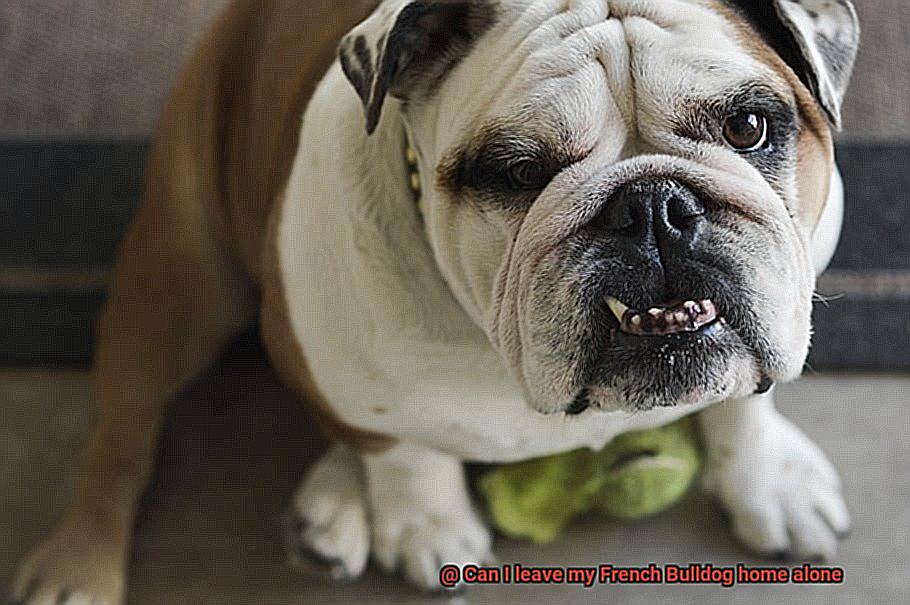
Consider Getting a Companion for Your French Bulldog
We all know the insatiable appetite our adorable fur babies have for love, attention, and companionship. But have you ever pondered the idea of adding another furry friend to your French Bulldog’s life? In this captivating post, we will delve into the reasons why considering a companion for your French Bulldog is not just beneficial, but essential. So, let’s embark on this journey together.
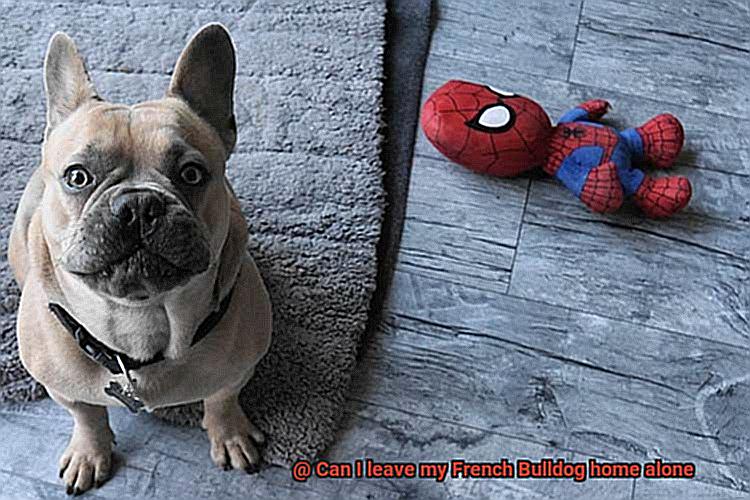
Banish Loneliness with a Pawsome Partner:
French Bulldogs are renowned for their sociability and affectionate nature. Leaving them alone for extended periods can evoke feelings of loneliness and anxiety. However, introducing a companion can alleviate these emotions and provide the perfect company your Frenchie craves.

Compatibility is Key:
When selecting a companion, it’s vital to consider compatibility and temperament. Whether it’s another dog, a cat, or even a small critter like a rabbit or guinea pig, ensure they mesh well with your Frenchie. Gradual introductions and supervised interactions at first are crucial for fostering a harmonious bond.
Unleash Mental Stimulation and Entertainment:
A companion for your French Bulldog equates to endless playtime, invigorating exercise, and enriching social interactions. This dynamic duo will engage in thrilling adventures together, warding off boredom and providing the mental stimulation your furry friend craves.
Alternatives to Enhance Socialization:
If getting another pet is not feasible, fret not. There are alternatives to ensure your Frenchie enjoys regular socialization. Consider enrolling them in doggie daycare or hiring a trusted pet sitter who can shower them with playful camaraderie during the day.
Remember, You’re Their Ultimate Pack Leader:
While having a companion is fantastic, remember that your French Bulldog still relies on you for quality time and care. Be their beacon of love and attention, and let their companion enhance their life rather than replace the bond you share.
PP49oLtdd3U” >
Conclusion
Yes, you can leave your French Bulldog home alone. However, it’s important to consider a few factors before doing so. French Bulldogs are known to be social animals, and they thrive on human interaction. Leaving them alone for extended periods of time can lead to feelings of loneliness and separation anxiety.
To ensure your French Bulldog’s well-being while you’re away, it’s crucial to make their environment comfortable and stimulating. Provide them with plenty of toys and activities to keep them occupied throughout the day. Puzzle toys, chew toys, and interactive games can help keep their minds engaged and prevent boredom.
Additionally, consider leaving a radio or TV on to provide some background noise and mimic the presence of company. This can help alleviate any feelings of isolation your furry friend may experience.
It’s also important to establish a routine for your French Bulldog when you’re not around. Set regular feeding times and stick to them consistently. This will help create a sense of structure and predictability in their day-to-day life.
If possible, try to arrange for someone to check in on your French Bulldog during the day or hire a dog sitter who can provide companionship and ensure their needs are met.
In conclusion, while it is possible to leave your French Bulldog home alone, it’s essential to take steps to minimize any potential negative effects such as loneliness or separation anxiety.
